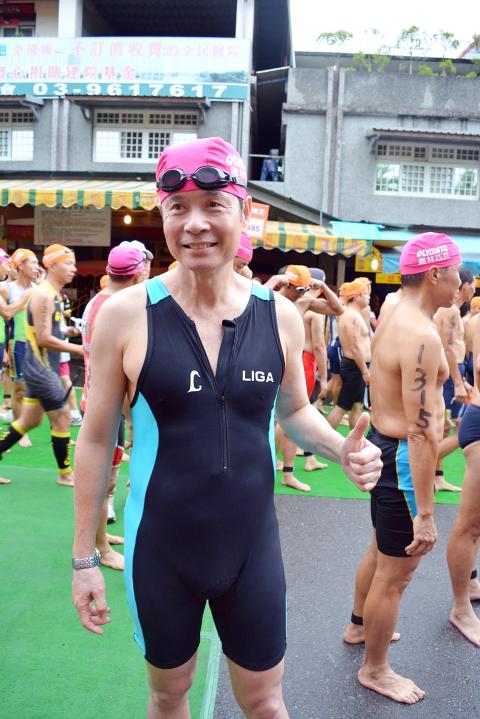A poll by the Taiwan Indicator Survey Research released on Friday found that President Ma Ying-jeou (馬英九) administration is not only losing popularity with the public, but its policies and conduct in judicial matters are coming under doubt.
A majority of the poll respondents felt that the Ma government had gone back on its 2008 promise to halt illegal wiretapping and other illegal actions.
The research group conducted the poll on Tuesday and Wednesday and asked two questions, but varied the answer style between random answers, itemized listing and multiple-choice.

Photo: Chu Tze-wei, Taipei Times
The questions were: “Has the government been choosing which judiciary cases to investigate” and “Has the government intervened illegally in judiciary affairs.”
The poll found that 72.4 percent of respondents said the government has abused its power, 67 percent said the government was selective in deciding which cases to investigate, 66.8 percent said the government was interfering with prosecutors’ investigations and 66.2 percent said the government was interfering with judicial cases.
The poll also found that 66.1 percent of respondents felt that political factors were preventing media from reporting on cases, 62.5 percent feel the government is conducting illegal wiretaps and 53.8 percent believe there is political interference with election organizations, while 13.6 percent declined to comment.
When asked whether they thought political interference with the judiciary had reached a severe stage, 59 .6 percent of respondents said there was severe political intervention with the judiciary and prosecutors’ investigations, 14.4 percent felt there was not severe intervention and 26 percent did not respond.
Cross-analysis of the data showed that even 49.7 percent of Chinese Nationalist Party (KMT) supporters felt their selective prosecutions had reached a severe level.
The poll also found that 72.4 percent of respondents were dissatisfied with the president’s performance, while 15.6 percent were satisfied.
The results show 19.9 percent of respondents trust the government, while 62.5 percent do not.
The poll also found that 51 percent of respondents do not trust National Security Council Secretary-General King Pu-tsung (金溥聰) and 15.1 percent said they did trust him, while 34 percent decline to comment.
The survey polled individuals aged 20 years or over and collected 1,009 valid samples. The margin of error is 3.1 percentage points.

ANOTHER EMERGES: The CWA yesterday said this year’s fourth storm of the typhoon season had formed in the South China Sea, but was not expected to affect Taiwan Tropical Storm Gaemi has intensified slightly as it heads toward Taiwan, where it is expected to affect the country in the coming days, the Central Weather Administration (CWA) said yesterday. As of 8am yesterday, the 120km-radius storm was 800km southeast of Oluanpi (鵝鑾鼻), Taiwan’s southernmost tip, moving at 9kph northwest, the agency said. A sea warning for Gaemi could be issued tonight at the earliest, it said, adding that the storm is projected to be closest to Taiwan on Wednesday or Thursday. Gaemi’s potential effect on Taiwan remains unclear, as that would depend on its direction, radius and intensity, forecasters said. Former Weather Forecast

As COVID-19 cases in Japan have been increasing for 10 consecutive weeks, people should get vaccinated before visiting the nation, the Centers for Disease Control (CDC) said. The centers reported 773 hospitalizations and 124 deaths related to COVID-19 in Taiwan last week. CDC Epidemic Intelligence Center Director Guo Hung-wei (郭宏偉) on Tuesday said the number of weekly COVID-19 cases reported in Japan has been increasing since mid-May and surpassed 55,000 cases from July 8 to July 14. The average number of COVID-19 patients at Japan’s healthcare facilities that week was also 1.39 times that of the week before and KP.3 is the dominant

The Chinese Communist Party’s (CCP) working group for Taiwan-related policies is likely to be upgraded to a committee-level body, a report commissioned by the Mainland Affairs Council (MAC) said. As Chinese President Xi Jinping (習近平) is increasingly likely to upgrade the CCP’s Central Leading Group for Taiwan Affairs, Taiwanese authorities should prepare by researching Xi and the CCP, the report said. At the third plenary session of the 20th Central Committee of the CCP, which ended on Thursday last week, the party set a target of 2029 for the completion of some tasks, meaning that Xi is likely preparing to

US-CHINA TRADE DISPUTE: Despite Beijing’s offer of preferential treatment, the lure of China has dimmed as Taiwanese and international investors move out Japan and the US have become the favored destinations for Taiwanese graduates as China’s attraction has waned over the years, the Ministry of Labor said. According to the ministry’s latest income and employment advisory published this month, 3,215 Taiwanese university graduates from the class of 2020 went to Japan, surpassing for the first time the 2,881 graduates who went to China. A total of 2,300 graduates from the class of 2021 went to the US, compared with the 2,262 who went to China, the document showed. The trend continued for the class of 2023, of whom 1,460 went to Japan, 1,334 went to